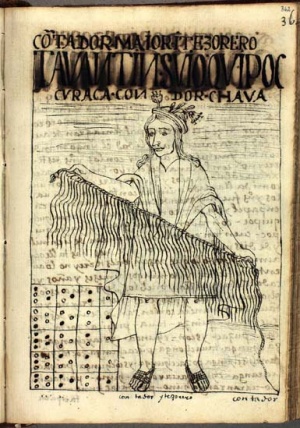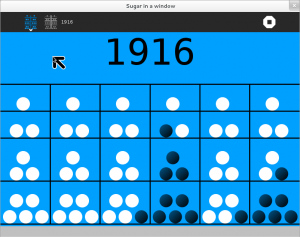Activities/Yupana: Difference between revisions
| Line 23: | Line 23: | ||
There are some alternative interpretations of how the Yupana works, e.g., [http://www.atlantisbolivia.org/decodingquipumaths.htm]. In this version, the base is 20, and rows with multiple dots are counted as 2s. | There are some alternative interpretations of how the Yupana works, e.g., [http://www.atlantisbolivia.org/decodingquipumaths.htm]. In this version, the base is 20, and rows with multiple dots are counted as 2s. | ||
Yet another interpretation (by the author) is that the factor of each bead is based on the number of beads in its containing box. | Yet another interpretation (by the author) is that the factor of each bead is based on the number of beads in its containing box, e.g., each bead in the top row, x1; in the second row, x2; in the third row, x3; and in the bottom row, x5. | ||
Both of these alternative interpretations are available under the "spanner" toolbar beginning with Version 3. And in a subsequent version, the learner will be able to explore their own interpretations of how the Yupana works. | Both of these alternative interpretations are available under the "spanner" toolbar beginning with Version 3. And in a subsequent version, the learner will be able to explore their own interpretations of how the Yupana works. | ||
Revision as of 12:31, 6 February 2012
Yupana
Yupana is an Incan counting device similar to an abacus.
How to use the Yupana
The beads are organized in columns, where the units (1s) column is farthest to the right; tens (10s) is second from the right; hundreds (100s) is third from the right, etc.
Click on a dot and it will reverse its state (color), and either add or substract value from that column.
More details regarding the history and use of the Yupana can be found here:
Yupana como herramienta pedagogica.pdf
- Did you know that you can use the yupana over the network with your friends?
An alternative interpretation
There are some alternative interpretations of how the Yupana works, e.g., [1]. In this version, the base is 20, and rows with multiple dots are counted as 2s.
Yet another interpretation (by the author) is that the factor of each bead is based on the number of beads in its containing box, e.g., each bead in the top row, x1; in the second row, x2; in the third row, x3; and in the bottom row, x5.
Both of these alternative interpretations are available under the "spanner" toolbar beginning with Version 3. And in a subsequent version, the learner will be able to explore their own interpretations of how the Yupana works.
Where to get Yupana
The Yupana activity is available for download from the Sugar activity portal: Yupana
The source code is available on the Sugar Labs Gitorious server.

